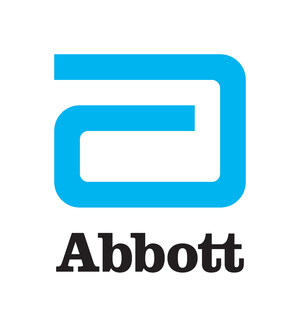Abbott's Groundbreaking Bioresorbable Technology Continues to Demonstrate Exceptional Clinical Results
New Six-Month Data on Abbott's Bioresorbable Vascular Scaffold Reinforces Its Potential to Be the Next Revolution in Interventional Cardiology
PARIS, May 25 /PRNewswire-FirstCall/ -- Abbott (NYSE: ABT) today announced positive six-month results from the first 45 patients enrolled in the second stage of the ABSORB trial, which was presented during the Late-Breaking Clinical Trials session at the EuroPCR 2010 conference. At six months, Abbott's bioresorbable vascular scaffold (BVS) demonstrated strong results, with a low (4.4 percent) rate of major adverse cardiac events (MACE(1)) and no blood clots (thromboses). Abbott's BVS also demonstrated an in-stent late loss rate of 0.19 mm. Late loss is a measure of vessel re-narrowing and looks at the change in the diameter inside the device between the time immediately following scaffold placement and at six months. The amount of re-narrowing tells physicians how effective a scaffold procedure was at keeping the blood vessel open.
"With each new data milestone, Abbott's revolutionary BVS technology is one step closer to becoming a reality. The device achieved a six-month late loss rate of 0.19 mm. This finding suggests that the BVS may have the potential to treat a blocked vessel as effectively as a metallic drug eluting stent, with the added potential benefit of not leaving a permanent implant behind after the vessel is healed," said Patrick W. Serruys, M.D., Ph.D., professor of interventional cardiology at the Thoraxcentre, Erasmus University Hospital, Rotterdam, the Netherlands, and principal investigator for the ABSORB trial. "These extraordinary findings signal that Abbott's disappearing scaffold may become the new standard of care for treating coronary artery disease."
Abbott's BVS, which is under clinical investigation in Europe, Australia and New Zealand and is not currently available for sale anywhere in the world, is made of polylactide, a proven biocompatible material that is commonly used in medical implants such as dissolving sutures. The bioresorbable technology is designed to restore blood flow by opening a clogged vessel and providing support until it is healed. Once the vessel can remain open without the extra support, the bioresorbable scaffold is designed to be slowly metabolized and eventually resorbed by the body. Since a permanent implant is not left behind, a vessel treated with a BVS ultimately may have the ability to move, flex and pulsate similar to an untreated vessel. The potential to restore these naturally occurring vessel functions, or vascular restoration, is one of the features that will make Abbott's BVS unique in the treatment of coronary artery disease.
"In addition to achieving low late loss, Abbott's bioresorbable scaffold demonstrated positive clinical outcomes, with no thrombosis and a low rate of adverse events at six months. These results are encouraging and add to the strong body of BVS data that has been gathered over the last several years," said Charles A. Simonton, M.D., FACC, FSCAI, divisional vice president, Medical Affairs, and chief medical officer, Abbott Vascular. "The ABSORB trial is a perfect example of Abbott's dedication to developing technology that has the potential to revolutionize the way physicians treat coronary artery disease."
About the ABSORB Clinical Trial
The ABSORB trial is a prospective, non-randomized (open label), two-phase study that enrolled 131 patients from Australia, Belgium, Denmark, France, the Netherlands, New Zealand, Poland and Switzerland. Key endpoints of the study include assessments of safety – MACE and treated site thrombosis rates – at 30 days; six, nine, 12 and 24 months; with additional annual clinical follow-up for up to five years, as well as an assessment of the acute performance of the bioresorbable vascular scaffold, including successful deployment of the system. Other key endpoints of the study include imaging assessments by angiography, intravascular ultrasound (IVUS), optical coherence tomography (OCT), and other state-of-the-art invasive and non-invasive imaging modalities at six, 12, 18 and 24 months. The next 56 patients in the second phase of the ABSORB trial will undergo imaging follow-up one year after their procedures, and all 101 patients in the second phase of the trial will receive follow-up imaging at two years.
Abbott's bioresorbable technology delivers everolimus, an anti-proliferative drug. Everolimus is developed by Novartis Pharma AG and is licensed to Abbott by Novartis for use on its drug eluting vascular devices. Everolimus has been shown to inhibit treated site neointimal growth in the coronary vessels following vascular device implantation, due to its anti-proliferative properties.
About Abbott Vascular
Abbott Vascular is a global leader in cardiac and vascular care with market-leading products and an industry-leading pipeline. Abbott Vascular offers a comprehensive cardiac and vascular devices portfolio, including products for coronary artery disease, vessel closure, endovascular disease, and structural heart disease.
About Abbott
Abbott is a global, broad-based health care company devoted to the discovery, development, manufacture and marketing of pharmaceuticals and medical products, including nutritionals, devices and diagnostics. The company employs approximately 83,000 people and markets its products in more than 130 countries.
Abbott's news releases and other information are available on the company's Web site at www.abbott.com.
(1) MACE is a composite measure of key efficacy and safety endpoints and includes cardiac death, heart attack (myocardial infarction) and ischemia-driven target lesion revascularization.
SOURCE Abbott
WANT YOUR COMPANY'S NEWS FEATURED ON PRNEWSWIRE.COM?
Newsrooms &
Influencers
Digital Media
Outlets
Journalists
Opted In





Share this article